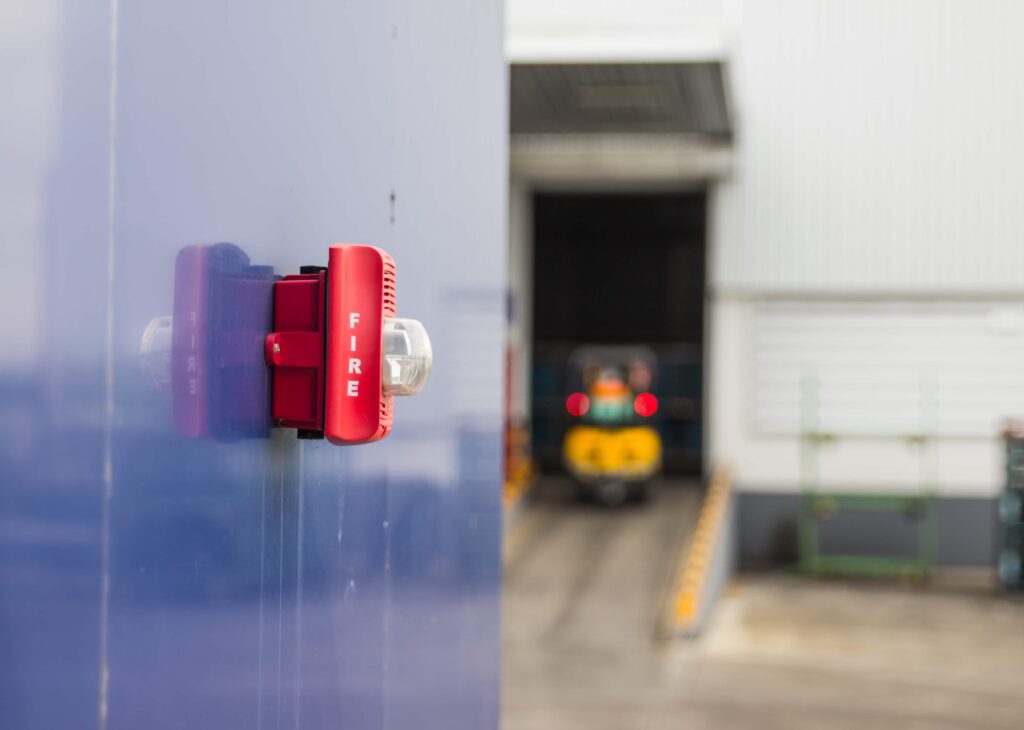When your fire alarm or sprinkler system goes offline, or when planning hot work on-site and extra protection is needed, you probably need to reach out to a fire guard company for safety and code compliance. But how much does a fire watch cost, exactly?
As you might expect, the answer isn’t a simple fixed, inarguable dollar amount. There are many variables to consider, and being aware of them now can help you budget more effectively, avoid unexpected expenses, and obtain the right coverage for your specific situation.
Either way, a reputable fire guard cost is probably far less than you might have imagined. We will get to that later, but first, let’s briefly cover why there is no specific, fixed cost associated with a fire watch guard.
Key Points
- Most clients pay between $40 and $60 per hour for standard fire-watch work.
- Higher-risk sites cost more.
- Emergency calls cost the most.
- Longer jobs lower the average hourly price.
- Your exact quote depends on your building, schedule, and the current site conditions.
Why Fire-Watch Pricing Shifts From Job to Job
Every fire-watch job has different factors to consider. When we put together a fire watch quote, we look at the same core factors each time, because those are the ones that matter when you need reliable coverage.
Here are the variables that usually shape the rate:
- Location: Some areas cost more to staff, especially major metro zones.
- Schedule: A planned shift during normal hours costs less than a middle-of-the-night request.
- Risk level: Hot work, construction zones, chemical storage, or large facilities require more attention and training.
- Duration: Short jobs carry a higher per-hour cost, while extended coverage lowers the average.
- Documentation needs: Some sites require strict logs or recurring reports for inspectors.
In the vast majority of cases, this is the general basis of your average fire watch cost breakdown. Equipped with that information, the pricing becomes far easier to map out.
The Key Variables at a Glance
If it helps, you can share this with your maintenance team, project manager, or business partner if multiple people need to sign off on the expense:
| Factor | How it affects pricing |
| Location | Urban areas tend to have higher labor costs. |
| Duration | Longer assignments lower the hourly average. |
| Risk level | Higher-risk sites require more training and oversight. |
| Schedule | Urgent or after-hours requests increase the rate. |
| Guard type | Specialized guards cost more |
| Documentation | Some sites require detailed logging or inspector-ready reports. |
This gives you a clear indication of why two different properties rarely fall into the exact same pricing bracket. But what about the actual cost of a fire watch guard, in terms of dollar amounts?
Let’s take a look.
Typical ranges for standard coverage
So, how much does a fire watch cost in practical, digestible terms?
A standard guard handling normal fire-watch duties usually falls around $40–$60 per hour. That’s the most common fire watch hourly rate we see for routine assignments.
This covers typical situations such as:
- A sprinkler system temporarily offline
- Alarm panel issues
- A basic overnight watch during repairs
- Short-term coverage in a building with minimal hazards
In short, these figures are based on your typical job: nothing too complex, but still requiring someone alert, trained, and logging the rounds correctly and diligently.

When the Rate Goes Higher
That said, some sites push the rate up slightly, and that’s not because we like big invoices — it’s simply the nature of the job. A few settings usually land at the higher end owing to reasons such as:
- Construction sites with active work
- Hot-work operations (cutting, grinding, welding)
- Properties with large square footage
- High-value environments that require a specialized guard
- Emergency situations where someone needs to arrive fast
These situations add an extra layer of responsibility and risk to the assignment, and the rate reflects that.
For example, if you call at 2 a.m. for immediate coverage, you can expect to pay more than someone scheduling for next Wednesday at 8 a.m. That’s not unique to Fast Fire Watch Co; it’s a true reflection of billing practices across the entire fire-watch industry.
Examples to Show How the Numbers Play Out
To recap, the average fire patrol will likely run between $40 and $60 per hour, but there are caveats – circumstances that will raise the price depending on unique requirements.
If that still feels a little ambiguous, here are a few real-world examples based on the patterns we see every week. Please note, these numbers are not fixed and serve as approximate examples only:
Scenario 1: The Straightforward Job
A retail space loses its alarm signal and needs eight hours of overnight coverage. The area is easy to staff, and the request isn’t urgent.
Rate: $45/hour
Total: $360
Simple, predictable, nothing unusual.
Scenario 2: High-Risk but Scheduled
A construction crew is performing hot work on the fifth floor and requires a guard for the evening. The site is active, and the risks are higher, but the request isn’t last-minute.
Rate: $55/hour
Total: $440 for an eight-hour shift
It costs more than a basic watch, but it is still comfortably within the normal price range.
Scenario 3: Urgent and Complex
A manufacturing facility has a system outage late on a weekend. The property stores sensitive materials, and they need coverage immediately. Due to the high risk level and urgency, the rate falls at the higher end of the range.
Rate: $90/hour
Total: $720 for the first eight hours
Emergency staffing at a high-risk site always pushes the rate to the upper end.
So, as you can see, determining how much a fire watch costs isn’t as simple as arriving at a single number. It’s a range that moves with the site and situation.
How Extended Jobs Bring the Price Down
Unexpected outages happen all the time. But sometimes a property knows it will need a fire watch for an extended period, it may be several days or even weeks. Longer deployments usually lower the average hourly cost because:
- The guard stays on the same site and gets familiar with it
- Travel and logistics become easier to manage
- There’s less back-and-forth scheduling
- Staffing becomes more predictable on our end
Essentially, it’s really no different from how long-term construction security, cleaning crews, or maintenance agreements work. The more predictable the project, the easier it is for us to give you a better rate.
What Happens When You Choose Only by Price
It might sound like a rather obvious statement, but fire-watch coverage isn’t something you want handled cheaply or casually. The simple fact of the matter is that a guard who isn’t alert, trained, or logging correctly puts the property at great risk.
⚠️Remember, fire marshals can (and frequently do) shut down buildings when fire-watch rules aren’t followed!
For example, we have taken over jobs where the previous guard didn’t log rounds, didn’t stay on route, or didn’t understand the reporting requirements. In those cases, the “lower price” ended up costing the property far more in delays and penalties.
So yes, pricing is important, not just for your bottom line, but for reasons of quality, safety, and code compliance.
But reliability is equally important. When a building’s system goes offline, you need a guard who actually knows what to do, not poorly trained guards who spend half their time scrolling through a phone in the lobby.
Given the sheer number of sub-standard fire watch companies around these days, that is, unfortunately, quite a common occurrence.
What We Ask You During the Quote Call
Given the variables, what is the most effective way to determine a specific amount in relation to the fire watch hourly rate? The answer is simple: just call us for a quote.
To make sure your quote is accurate, we usually ask a few quick questions:
- What kind of property is it?
- Has the fire marshal been involved?
- Is any hot work happening on site?
- How many hours do you need?
- When do you need the guard to arrive?
- Are logs required for inspectors or insurance?
This helps us build a fair quote and match you with the right guard quickly.
Emergency Pricing
Emergency calls really are their own category. When someone asks, “Can you get someone here right now?” the rate shifts because the entire job changes the moment urgency comes into the equation. Again, that could be said of any call-out service.
Plumbers, for example, are almost certainly going to charge slightly higher rates for an emergency “get here now” type of call over a pre-arranged appointment to fix your boiler.

In those situations, a guard may need to be pulled from an active standby list or sent from farther away than we would normally schedule. Our dispatch and supervision teams also begin moving things around immediately, often outside regular staffing hours, just to establish coverage.
These calls usually come with a higher risk, too, since system failures rarely wait for a convenient moment. We handle urgent deployments all the time, but they naturally cost more because of the extra coordination and the speed involved.
How to Plan Ahead (When Possible)
When you know something like repairs or a special event fire watch is needed, just give us a quick call in advance. Even a single day’s notice makes it far easier to staff and usually lowers the hourly rate.
Some clients schedule weeks ahead for major projects, and those are always the easiest jobs to quote. Remember, a small amount of planning can save you quite a bit of expense, especially if you need multiple guards.
Ready to Get a Quote?
You can reach Fast Fire Watch Guards at 1-800-899-7524. The process is really quite simple: just tell us what’s happening at the property, and we will guide you through the details right away. Alternatively, you can reach out to us through our contact form to request a quote.
We promise no drawn-out process or nasty hidden fees – just a straightforward quote based on the fire watch cost breakdown we use for every client.
FAQs
How much does a fire watch cost?
Most (but certainly not all) routine jobs cost between $40 and $60 per hour, depending on the site and schedule, although urgent calls, large facilities, and higher-risk environments can push the rate a little higher. The fastest way to get an exact number is to tell us what’s happening at the property, how long you need coverage, and when you need a guard on site.
What affects the fire watch hourly rate?
The rate changes based on location, the level of risk, how quickly you need coverage, and the length of the assignment. A simple overnight watch at a small property is priced differently from a complex, short-notice job at a large facility.
Do you offer same-day service?
Yes, we handle same-day and immediate requests every week. When the system goes down without warning, we can respond quickly — just keep in mind that urgent jobs incur higher costs because they require rapid coordination and off-hour staffing.
How long can a fire watch run?
Some clients only need a single shift while their alarm panel resets. Others run multi-day or multi-week coverage during repairs or construction. We can schedule short-term or extended coverage depending on what’s happening at your property.
What information do I need to get a quote?
We will ask for the property type, the reason for the fire watch, the hours you need covered, and when the guard should arrive. If inspectors or insurance require specific logs, please let us know — we will factor that into the plan and provide you with a precise quote.

